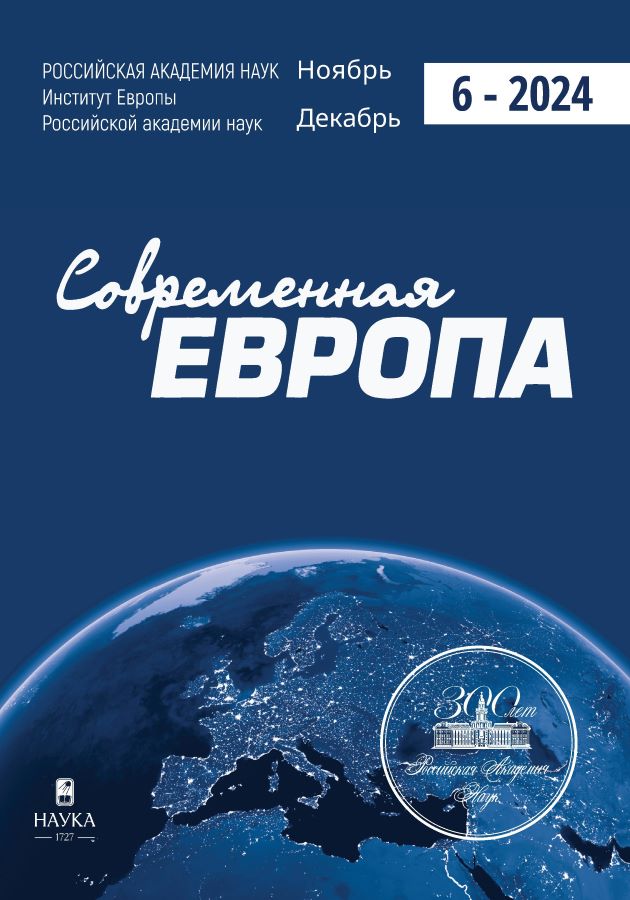Ukrainian Crisis and the Perspectives of the Identism
- Авторлар: Lunkin R.N1, Filatov S.B2
-
Мекемелер:
- Institute of Europe RAS
- Institute of Oriental Studies of the Russian Academy of Sciences
- Шығарылым: № 6 (127) (2024)
- Беттер: 204-217
- Бөлім: PROBLEMS OF IDENTITY
- URL: https://ter-arkhiv.ru/0201-7083/article/view/652309
- DOI: https://doi.org/10.31857/S0201708324060184
- ID: 652309
Дәйексөз келтіру
Аннотация
The article analyzes the impact of the Ukrainian crisis on the ideological confrontation between identists and antiidentists (ultraliberals, supporters of “liberal democracy”) in the world and the influence of crisis on the prospects of the further consolidation of identism. Identism is considered as the worldview of parties and movements that defend identity and traditions, family values, and criticize immigration to varying degrees and with different accents. It is emphasized that the appeal to identity is increasing in current political decisions and discussions. It raises the question of rethinking the “clash of civilizations” through the dynamics of universalism and particularism, referring to tradition and the protecting identity in the programs of political parties. The analysis of political conflicts and speeches by the leaders of parties and movements demonstrated that anti–Russian policy and the policy of “cancel culture” towards Russia have become a manifestation of a new round of confrontation between mainly Western antiidentism and an emerging global force ‒ traditionalism or identism. Most politicians, public and cultural figures were faced with the dilemma of whether to make a choice in favor of Russia in order to dissociate themselves from antiidentism or to stay away. The logic of confrontation is based on the displacement (in the consistent and harsh application of cancel culture) of one's ideological opponent into a marginal field, if it is not possible to achieve his complete destruction as a social or political player. The Ukrainian crisis has made the confrontation between identitarians and antiidentitarians more pronounced at the international level and opponents of antiidentism have become part of the political space of most countries. The most important feature of the confrontation between the two ideological systems is the significant presence of supporters of various opposing parties in almost all countries and regions.
Авторлар туралы
R. Lunkin
Institute of Europe RAS
Email: romanlunkinn@yandex.ru
Doctor of l Sciences (Politics), Candidate of Philosophical Sciences, Professor of the Russian Academy of Sciences, Deputy Director Moscow, Russia
S. Filatov
Institute of Oriental Studies of the Russian Academy of Sciences
Email: sfilatov2006@yandex.ru
Candidate of Sciences (History), Senior Researcher Moscow, Russia
Әдебиет тізімі
- Величкин С.В. (2024) Внешняя политика Индии как отражение изменений в индийской правящей элите. Международная аналитика. № 15(1). С. 191-209. https://doi.org/10.46272/2587-8476-2024-15-1-191-209
- Гуселетов Б.П. (2024) Позиции ведущих европартий накануне выборов в Европейский парламент 2024 г. Современная Европа. № 3. С. 68-81. doi: 10.31857/S0201708324030069
- Журавлева В.И. (2024) Россия и США как значимые Другие в национальных дискурсах идентичности. Международная аналитика. № 15(1). С. 20-45. https://doi.org/10.46272/2587-8476-2024-15-1-20-45
- Идентичность. Личность, общество, политика. Новые контуры исследовательского поля. (2023) Отв.ред. И.С. Семененко. «Весь Мир», ИМЭМО, Москва. С. 21.
- Кожухова К.Е. (2020) Китайские традиционные ценности как основание внешнеполитического курса Си Цзиньпина. Вестник Московского государственного лингвистического университета. Общественные науки. № 3(840).
- Крук А. (2024) Как вернуться в Золотой дом. Россия в глобальной политике. Т. 22. № 4. С. 163-171.
- Лю Цзоюань. (2022) Традиционная система ценностей в государственной идеологии КНР. Контекст и рефлексия: философия о мире и человеке. Том 11. № 2А. С. 199-204. doi: 10.34670/AR.2022.16.27.032
- Пименова Е.В. (2024) Проблемы национальной идентичности современной Германии в международном измерении. Международная аналитика. № 15(1). С. 173-190. https://doi.org/10.46272/2587-8476-2024-15-1-173-190
- Прохоренко И.Л. (2024) Идентичность как ключ к пониманию мировой политики. Международная аналитика. № 15(1). С. 11-19. https://doi.org/10.46272/2587-8476-2024-15-1-11-19
- Руткевич Н.А. (2024) Кто они, где они, за что они и почему. Россия в глобальной политике. Т. 22. № 4. С. 182-201.
- Фишман Л.Г. (2024) Хвост Модерна. Россия в глобальной политике. Т. 22. № 4. С. 172-181.
- Rai, Praveen. (2023) Political Legitimation and Charismatic Routinization of Modi ‘Wave’ in India. Journal of Asian and African Studies. 10.1177/00219096231179655.
Қосымша файлдар









